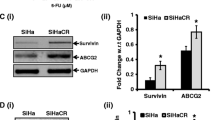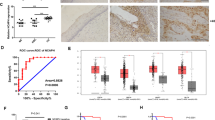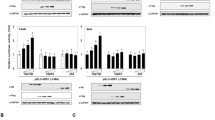Abstract
Objective
Compelling evidence establishes the etiological role of viral proteins E6 and E7 of high-risk human papillomaviruses (HPV) in cervical carcinogenesis, but their contribution in chemoresistance that leads to advanced metastatic lesions remains poorly defined. Since metastasis-associated protein 1 (MTA1) upregulation and augmentation of APOBEC3B expression are both strongly associated with cervical cancer (CCa) development, and both molecules have been shown to be functionally associated with NF-κB pathway, we therefore sought to investigate the potential mechanistic link between MTA1, APOBEC3B and NF-κB during the pathogenesis of cisplatin (CDDP) resistance in HPV-positive CCa cells.
Methods
MTA1 expression was assessed in HPV-transfected CCa cells using quantitative RT-PCR and immunoblotting. Effects of MTA1 deregulation on CDDP chemosensitivity in CCa cells were determined by measuring cell viability, apoptosis and in vivo oncogenic capacity. Finally, we studied the transcriptional regulation of the antiviral DNA cytosine deaminase APOBEC3B by MTA1 using multiple approaches including DNA deaminase activity assay, luciferase reporter assay, chromatin immunoprecipitation, co-immunoprecipitation and transient/stable transfection, at the molecular and functional levels.
Results
Expression levels of MTA1 were significantly induced in HPV-positive CCa cells. Transduction experiments showed that the E6 oncoprotein alone was sufficient to cause MTA1 upregulation. Moreover, MTA1 knockdown potentiated CDDP sensitivity in highly metastatic CCa cells. Mechanistically, MTA1 acted as an indirect upstream modulator of APOBEC3B transcription during the pathogenesis of CDDP chemoresistance. HPV-mediated stimulation of APOBEC3B expression was accompanied by the enhanced recruitment of Iκκ α/β and p65 to the NF-κB consensus sites in the APOBEC3B promoter, and this recruitment was substantially abrogated by MTA1 siRNA treatment.
Conclusions
These findings reveal an obligatory coregulatory role of MTA1 in the indirect regulation of APOBEC3B expression via classical NF-κB pathway, and also suggest that inhibition of MTA1/NF-κB/APOBEC3B cascade may be repositioned to suppress cancer mutagenesis, dampen tumor evolution, and decrease the probability of adverse outcomes from CDDP resistance in CCa.






Similar content being viewed by others
References
Zhu H, Luo H, Zhang W, Shen Z, Hu X, Zhu X (2016) Molecular mechanisms of cisplatin resistance in cervical cancer. Drug Des Devel Ther 10:1885–1895. https://doi.org/10.2147/DDDT.S106412
Vieira VC, Leonard B, White EA, Starrett GJ, Temiz NA, Lorenz LD, Lee D, Soares MA, Lambert PF, Howley PM, Harris RS (2014) Human papillomavirus E6 triggers upregulation of the antiviral and cancer genomic DNA deaminase APOBEC3B. MBio. https://doi.org/10.1128/mBio.02234-14
Michnov O, Solomayer E, Fehm T, Stubenrauch F, Iftner T (2012) Knock down of p53 or its ubiquitin ligase E6AP does not affect the sensitivity of human papillomavirus-positive cervical cancer cells to cisplatin. Am J Cancer Res 2(3):309–321
Zhang C, Lai JH, Hu B, Zhang S, Zhao J, Li W (2014) A chromatin modifier regulates Sertoli cell response to mono-(2-ethylhexyl) phthalate (MEHP) via tissue inhibitor of metalloproteinase 2 (TIMP2) signaling. Biochim Biophys Acta 1839(11):1170–1182. https://doi.org/10.1016/j.bbagrm.2014.08.006
Liu T, Yang M, Yang S, Ge T, Gu L, Lou G (2013) Metastasis-associated protein 1 is a novel marker predicting survival and lymph nodes metastasis in cervical cancer. Hum Pathol 44(10):2275–2281. https://doi.org/10.1016/j.humpath.2013.05.009
Rao Y, Wang H, Fan L, Chen G (2011) Silencing MTA1 by RNAi reverses adhesion, migration and invasiveness of cervical cancer cells (SiHa) via altered expression of p53, and E-cadherin/beta-catenin complex. J Huazhong Univ Sci Technolog Med Sci 31(1):1–9. https://doi.org/10.1007/s11596-011-0141-9
Pakala SB, Bui-Nguyen TM, Reddy SD, Li DQ, Peng S, Rayala SK, Behringer RR, Kumar R (2010) Regulation of NF-kappaB circuitry by a component of the nucleosome remodeling and deacetylase complex controls inflammatory response homeostasis. J Biol Chem 285(31):23590–23597. https://doi.org/10.1074/jbc.M110.139469
Chen JK, Wang WC, Zang L, Zhao J, Li W, Jiang T (2016) Repression of a chromatin modifier aggravates lipopolysaccharide-induced acute lung injury in mouse. Biochem Biophys Res Commun 471(4):515–521. https://doi.org/10.1016/j.bbrc.2016.02.043
Leonard B, McCann JL, Starrett GJ, Kosyakovsky L, Luengas EM, Molan AM, Burns MB, McDougle RM, Parker PJ, Brown WL, Harris RS (2015) The PKC/NF-kappaB signaling pathway induces APOBEC3B expression in multiple human cancers. Cancer Res 75(21):4538–4547. https://doi.org/10.1158/0008-5472.CAN-15-2171-T
Maruyama W, Shirakawa K, Matsui H, Matsumoto T, Yamazaki H, Sarca AD, Kazuma Y, Kobayashi M, Shindo K, Takaori-Kondo A (2016) Classical NF-kappaB pathway is responsible for APOBEC3B expression in cancer cells. Biochem Biophys Res Commun 478(3):1466–1471. https://doi.org/10.1016/j.bbrc.2016.08.148
Yu L, Su YS, Zhao J, Wang H, Li W (2013) Repression of NR4A1 by a chromatin modifier promotes docetaxel resistance in PC-3 human prostate cancer cells. FEBS Lett 587(16):2542–2551. https://doi.org/10.1016/j.febslet.2013.06.029
Dong YS, Hou WG, Li Y, Liu DB, Hao GZ, Zhang HF, Li JC, Zhao J, Zhang S, Liang GB, Li W (2016) Unexpected requirement for a binding partner of the syntaxin family in phagocytosis by murine testicular Sertoli cells. Cell Death Differ 23(5):787–800. https://doi.org/10.1038/cdd.2015.139
Zhang S, Li W, Zhu C, Wang X, Li Z, Zhang J, Zhao J, Hu J, Li T, Zhang Y (2012) Sertoli cell-specific expression of metastasis-associated protein 2 (MTA2) is required for transcriptional regulation of the follicle-stimulating hormone receptor (FSHR) gene during spermatogenesis. J Biol Chem 287(48):40471–40483. https://doi.org/10.1074/jbc.M112.383802
Lees BF, Erickson BK, Huh WK (2016) Cervical cancer screening: evidence behind the guidelines. Am J Obstet Gynecol 214(4):438–443. https://doi.org/10.1016/j.ajog.2015.10.147
Tewari KS, Monk BJ (2014) New strategies in advanced cervical cancer: from angiogenesis blockade to immunotherapy. Clin Cancer Res 20(21):5349–5358. https://doi.org/10.1158/1078-0432.CCR-14-1099
Kumar R, Wang RA (2016) Structure, expression and functions of MTA genes. Gene 582(2):112–121. https://doi.org/10.1016/j.gene.2016.02.012
Acknowledgements
We are grateful to Ms. Hui Wang (Department of Medical Psychology, Fourth Military Medical University, Xi’an, 710032, China) for her helpful advice and discussion regarding the possible functions of MTA1.
Author information
Authors and Affiliations
Corresponding author
Ethics declarations
Conflict of interest
Qiu-ping Jia declares that she has no conflict of interest. Chang-you Yan declares that he has no conflict of interest. Xue-rong Zheng declares that she has no conflict of interest. Xia Pan declares that she has no conflict of interest. Xin Cao declares that she has no conflict of interest. Lei Cao declares that she has no conflict of interest.
Electronic supplementary material
Below is the link to the electronic supplementary material.
Supplementary Fig. 1
MTA1 acts upstream of APOBEC3B signaling, and the regulation of APOBEC3B expression by MTA1 is dependent on the NF-κB pathway in CCa cells. (A, B) HeLa and SiHa cells were transfected with pCMV6-XL5-MTA1 or empty vector using Lipofectamine 2000. 48 h later, cells were harvested and were then incubated with 5 μM of parthenolide for another 6h, followed by RT-qPCR analysis of the expression levels of MTA1 and APOBEC3B transcripts in both cell types (*P<0.05; **P<0.01). (C, D) HeLa and SiHa cells were transfected with pCMV6-APOBEC3B or empty vector using Lipofectamine 2000. 48 h later, cells were harvested and subjected to RT-qPCR analysis of the expression levels of MTA1 and APOBEC3B transcripts in both cell types (*P<0.05; **P<0.01) (PPTX 81 KB)
Rights and permissions
About this article
Cite this article
Jia, Qp., Yan, Cy., Zheng, Xr. et al. Upregulation of MTA1 expression by human papillomavirus infection promotes CDDP resistance in cervical cancer cells via modulation of NF-κB/APOBEC3B cascade. Cancer Chemother Pharmacol 83, 625–637 (2019). https://doi.org/10.1007/s00280-018-03766-2
Received:
Accepted:
Published:
Issue Date:
DOI: https://doi.org/10.1007/s00280-018-03766-2




